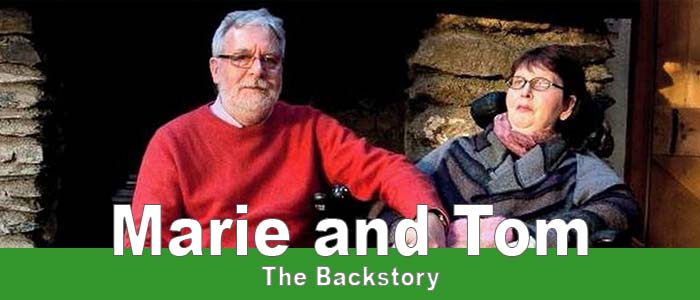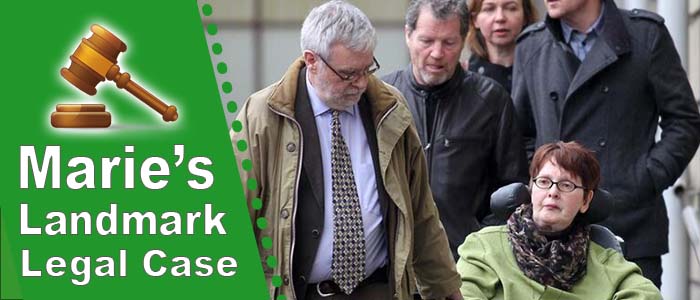February 6, 2022
Marie Fleming & Exit International Ireland
The Backstory of Marie Fleming & Exit International Ireland
I first met Marie Flemming in 2011, a few years before she died.
Having only recently become acquainted with Tom Curran, Tom had invited us down to his stone cottage in countryside Arklow for an evening meal.
At that time Marie was still able to speak so the evening was warm, friendly and convivial. I will never forget the generosity of Tom in inviting us to his home (something that he has done for few others, in his efforts to guard Marie’s privacy). In addition to cooking a fantastic meal, he attended to Marie’s every need.
Some might say he was run ragged, but it was a marathon in the name of love.
And here we are 11 years later with an organisation in Ireland that is dedicated and works in the memory of Marie Fleming.
When Marie died at home in December 2013, she had advanced MS. Marie had lost nearly all bodily movement and certainly most of her dignity. This was not the life she wanted. Neither of them wanted the anxiety of not knowing if/ when Marie would wake up each morning choking on her own saliva because she could no longer clear her lungs or her throat.
The running joke in the household was Marie ‘not dying on your watch’. But it really wasn’t very funny. Rather, it was terrifying.
But Marie Fleming was so much more than her disease.
As she herself said:
All people see now is a woman in a wheelchair who can’t speak very well, who can’t move at all. But I lived. I loved. I am somebody.
Marie had been a University College Dublin lecturer who taught, amongst other things, gender studies. She had two children, her first Corinna was born in a mother and baby home and was almost removed from her at birth.
Marie’s fight to save her daughter is a book in its own right.
Born one of five children in Donegal to parents who endured an especially dysfunctional marriage, Marie’s mother left home abruptly when she was 14, running off with the local hotelier and Irish Senator, Paddy McGowan.
Marie’s father would later take a High Court case against McGowan alleging ‘criminal conversation’ with his wife and for enticing her away from ‘his house and society’. But this did not stop her mother leaving home, a total of five times.
Marie Fleming’s story – told in the book An Act of Love – is about so much more than taking a landmark case to the Irish High and Supreme Courts even though that is how she is perhaps now best known.
Marie Fleming & Exit International Ireland. See: www.exitinternational.ie

The Court Cases
As Marie Fleming’s MS got worse, so did the paralysis until she could no longer lift her arm, sit up unassisted or even talk. And she certainly couldn’t take her own life (put an end to her suffering).
If she had had another condition (eg. cancer) it would have been more likely that she would still have had movement and she could have lawfully taken her own life as suicide is no longer a crime in the Irish Republic.
Marie’s initial case concerned a request for a declaration and orders that because she was paralysed from the MS, she needed help to die. Marie argued that she was discriminated against as a result of her illness. As Tom was willing to help her die it should have been QED.
Marie’s lawyers argued that the ban on assisted suicide was unconstitutional and incompatible with her rights under the European Convention on Human Rights (ECHR).
Marie also sought an order directing the Office of the Director of Public Prosecutions (DPP) about the issuance of guidelines (along the same lines as the Starmer guidelines in the UK) that would force the State to consider certain factors in deciding whether or not to prosecute an person for assisting or aiding another to end their life.
However the court disagreed.
So Marie appealed to the Supreme Court.
Again the Court disagreed with Marie Fleming & Exit International Ireland.
Chief Justice Mrs Justice Susan Denham, concluded that the right to life does not import a right to die and that there is no express right in the Irish Constitution to commit suicide.
Judge Denham continued that there is no constitutional right to commit suicide or to arrange for the termination of one’s life.
Judge Denham added, however, that there was nothing in the judgment to prevent the Government from introducing legislation in the future to deal with cases such as Ms Fleming’s.

Current Legislative Moves in Ireland
Ever since 2013, Exit International Ireland director, Tom Curran, has been lobbying for a change in the law so as no other people need go through what he and Marie went through.
As Tom himself has said:
‘law reform is a long and hard road but we must not give up. And we must not settle for the narrowest of laws that only help the terminally ill. This would be a mistake. Let us look to the Swiss model of assisted suicide’.
Since 1942, anyone can help anyone else to die in Switzerland as long as their motives are altruistic, and as long as the person receiving the help has mental capacity and can do the action themselves.
(In Marie’s case this might have meant administering lethal drugs via a cannula that allowed an eye-blink for activation or the new 3D-printed Sarco which is still in production).
The point is that Marie Fleming started the right to die movement in Ireland. It is only proper (and logical) that people like her would be able to be assisted by any change in the law.
2020
On 15 September 2020, TD Gino Kelly (People before Profit) introduced a private member’s bill to the Irish Dáil. By 7 October the bill passed its 2nd phase with majority support (81 to 71).
The Bill was intended to legalise Voluntary Assisted Dying (VAD) only for the terminally ill.
Despite receiving broad public support, the joint Committee on Justice did proceed (due to alleged insufficient safeguards for the elderly and vulnerable; concerns highlighted in some of the submissions considered).
2021
Almost a year later in July 2021, the Justice Committee stated that the Voluntary Assisted Dying Bill should be examined thoroughly by a a Special Committee. Some say this move is nothing but a stop-gap measure, aimed at buying time and doing nothing.
As of 2022, the Special Committee is yet to be established by the Oireachtas Business Committee. Should it be established it will be a cross-party committee comprised of 12 TD’s, representing all the parties.
It is interesting that in December 2021, the Irish Government announced a new €10 million in funding for palliative care services.
Call me cynical, but perhaps this was a smart move by the Government to rule out the old argument that we don’t need choice at the end of life, only better funded palliative care.
2022
In the coming months Exit will be holding a free public meeting at which we review the global state of play of right to die laws and explain why the Swiss do it better and why, in the name of Marie Fleming and countless others, Ireland is best placed adopt the Swiss legal model.
In 2023, Exit shall convene a major, international conference on the right to die.

Exit Conference in 2023
Exit International is currently planning for a major international right to die conference to be held in Dublin in May-June 2023.
To register your interest in any/ all Exit Ireland activities, you are invited to subscribe to our free Email List now.

Exit